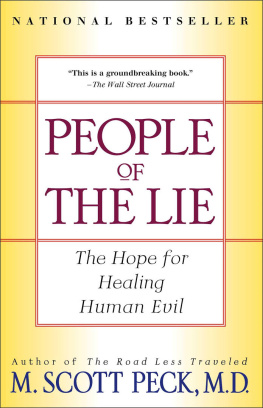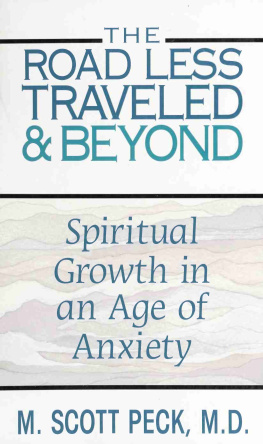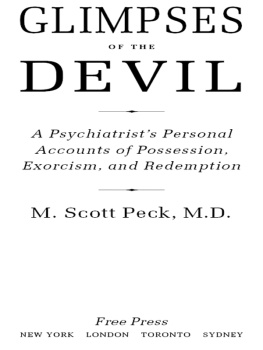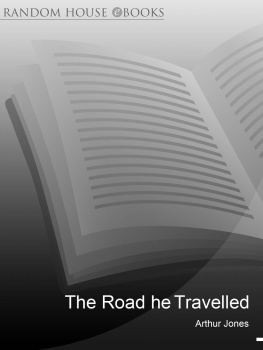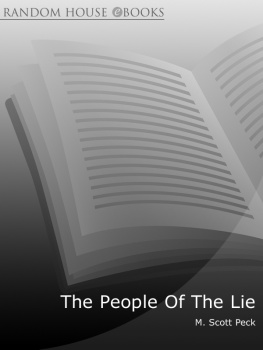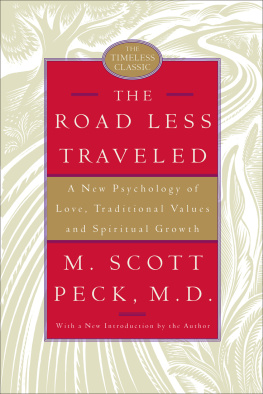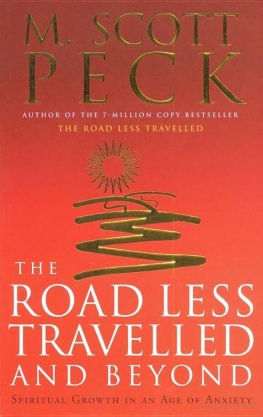Contents
About the Author
A graduate of both Harvard University and Case Western Reserve, Dr M. Scott Peck served in the Army Medical Corps from 1963 to 1972 and had a private practice in psychiatry from 1972 to 1983. He then devoted much of his time and financial resources to the work of the Foundation for Community Encouragement, a non-profit organisation which he and his wife, Lily, helped found in 1984. Dr M. Scott Peck died in 2005.
ALSO BY M. SCOTT PECK
The Road Less Travelled
What Return Can I Make?
(With Marilyn von Waldner and Patricia Kay)
(Republished with Marilyn von Waldner as Gifts for the Journey)
The Different Drum
A Bed by the Window
The Friendly Snowflake
(Illustrated by Christopher Peck)
A World Waiting to be Born
Meditations from the Road
Further Along the Road Less Travelled
In Search of Stones
(Illustrated by Christopher Peck)
In Heaven as on Earth
Denial of the Soul
The Road Less Travelled and Beyond
Golf and the Spirit
PEOPLE
OF THE LIE
The Hope for Healing Human Evil
M. Scott Peck, M.D.
For Lily
who serves so many ways,
only one of which has been
to wrestle with demons
Handle with Care
THIS IS A dangerous book.
I have written it because I believe it is needed. I believe its over-all effect will be healing.
But I have also written it with trepidation. It has potential for harm. It will cause some readers pain. Worse, some may misuse its information to harm others.
I have inquired of several preliminary readers whose judgment and integrity I particularly respect: Do you think this book about human evil is itself evil? Their answer was no. One, however, added, Some of us in the Church have a saying that even the Virgin Mary can be used for sexual fantasy.
While this crude but pithy response is realistic, I do not find it greatly reassuring. I apologize to my readers and to the public for the harm this book may cause, and I plead with you to handle it with care.
One meaning of care is love. Be gentle and loving with yourself if you find what is written causing you pain. And please be gentle and loving with those neighours you may come to understand as evil. Be carefulfull of care.
Evil people are easy to hate. But remember Saint Augustines advice to hate the sin but love the sinner. Remember when you recognize an evil person that truly, There but for the grace of God go I.
In labelling certain human beings as evil, I am making an obviously severely critical value judgment. My Lord said, Judge not, that ye be not judged. By this statementso often quoted out of contextJesus did not mean we should never judge our neighbour. For he went on to say, Thou hypocrite, first cast out the beam out of thine own eye; and then shalt thou see clearly to cast out the mote out of thy brothers eye. What he meant was that we should judge others only with great care, and that such carefulness begins with self-judgment.
We cannot begin to hope to heal human evil until we are able to look at it directly. It is not a pleasant sight. Many observed that my previous book, The Road Less Travelled, was a nice book. This is not a nice book. It is about our dark side, and in large part about the very darkest members of our human communitythose I frankly judge to be evil. They are not nice people. But the judgment needs to be made. It is the principal thesis of this work that these specific peopleas well as human evil in generalneed to be studied scientifically. Not in the abstract. Not just philosophically. But scientifically. And to do that we must be willing to make judgments. The dangers of such judgments will be elaborated at the beginning of the concluding section of the book. But I ask you for the present to bear in mind that such judgments cannot be made safely unless we begin by judging and healing ourselves. The battle to heal human evil always begins at home. And self-purification will always be our greatest weapon.
This book has been most difficult to write for many reasons. Preeminent among them is that it has always been a book in process. I have not learned about human evil; I am learning. In fact, I am just beginning to learn. One chapter is entitled Toward a Psychology of Evil precisely because we do not yet have a body of scientific knowledge about evil sufficient to be dignified by calling it a psychology. So let me add another note of caution: Do not regard anything written here as the last word. Indeed, the purpose of the book is to lead us to dissatisfaction with our current state of ignorance of the subject.
I referred earlier to Jesus as my Lord. After many years of vague identification with Buddhist and Islamic mysticism, I ultimately made a firm Christian commitmentsignifiied by my non-denominational baptism on the ninth of March 1980, at the age of forty-threelong after I had begun working on this book. In a manuscript he sent me an author once apologized for his Christian bias. I make no such apology. I would hardly have committed myself to something I regarded as a bias. Nor do I desire to disguise my Christian outlook. In fact, I couldnt. My commitment to Christianity is the most important thing in my life and is, I hope, pervasive and total.
But I am concerned that this outlook will, when most apparent, unnecessarily bias some readers. So I ask you to be careful in this respect also. Great evil has been committed throughout the centuriesand is still being committedby nominal Christians, often in the name of Christ. The visible Christian Church is necessary, even saving, but obviously faulty, and I do apologize for its sins as well as my own.
Crusades and inquisitions have nothing to do with Christ. War, torture, and persecution have nothing to do with Christ. Arrogance and revenge have nothing to do with Christ. When he gave his one recorded sermon, the first words out of Jesus mouth were, Blessed are the poor in spirit. Not the arrogant. And as he was dying he asked that his murderers be forgiven.
In a letter to her sister, Saint Theresa of Lysieux wrote, If you are willing to serenely bear the trial of being displeasing to yourself, then you will be for Jesus a pleasant place of shelter. To define a true Christian is a risky business. But if I had to, my definition would be that a true Christian is anyone who is for Jesus a pleasant place of shelter. There are hundreds of thousands who go to Christian churches every Sunday who are not the least bit willing to be displeasing to themselves, serenely or otherwise, and who are not, therefore, for Jesus a pleasant place of shelter. Conversely, there are millions of Hindus, Buddhists, Muslims, Jews, atheists, and agnostics who are willing to bear that trial. There is nothing in this work that should offend the latter. Much may offend the former.
I feel compelled to make another nonapology. Many readers are likely to be concerned about my use of masculine pronouns in relation to God. I think I both understand and appreciate their concern. It is a matter to which I have given much thought. I have generally been a strong supporter of the womens movement and action that is reasonable to combat sexist language. But first of all, God is not neuter. He is exploding with life and loveeven sexuality of a sort. So It is not appropriate. Certainly I consider God androgynous. He is as gentle and tender and nurturing and maternal as any woman could ever be. Nonetheless, culturally determined though it may be, I subjectively experience His reality as more masculine than feminine. While He nurtures us, He also desires to penetrate us, and while we more often than not flee from His love like a reluctant virgin, He chases after us with a vigour in the hunt that we most typically associate with males. As C. S. Lewis put it, in relation to God we are all female. Moreover, whatever our gender or conscious theology, it is our dutyour obligationin response to His love to attempt to give birth, like Mary, to Christ in ourselves and in others.

